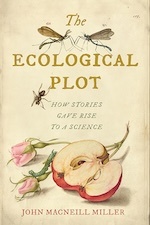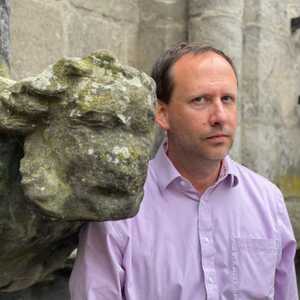Today, we are happy to bring you our conversation with John MacNeill Miller, author of The Ecological Plot: How Stories Gave Rise to a Science
What inspired you to write this book?
I’ve always felt torn between the arts and sciences—and always resented the idea that a singular, narrow focus was the goal of education, the sign of real expertise. Unsurprisingly, then, this project began at the intersection of two broad, seemingly unrelated interests of mine: literature and animals. I was writing about animal characters in novels, trying to figure out what literature could tell us about creatures that are typically studied by scientists. Puzzling over that led me into an investigation of all the ways literature and science haven’t always been so distinct, and it forced me to dive into the history of how they parted ways with one another. This book about the entangled histories of literature, ecology, and economics is the result!
What did you learn and what are you hoping readers will learn from your book?
I’m hoping readers will gain insights into the benefits of thinking across disciplines—in part by recognizing how recent and arbitrary our system of specialization really is. Ecology is the scientific study of interconnection, and the ecological problems we face now can’t be solved by some isolated focus. This book is a literary history, of course, but I hope it also offers one example of how we might combine specialties to see the world with fresh eyes. What I learned from writing this history is how rewarding, but also how difficult that process of moving between fields can be! We’re always on shaky ground when we leave the knowledge and habits of thought we’re trained in and explore other modes of knowing.
What surprised you the most in the process of writing your book?
Going into this book, I knew I was dealing with thinkers whose influence was extensive. Some of them remain well-known (Charles Darwin and Thomas Hardy) while others have been almost forgotten (like Harriet Martineau), but they were all prominent in their day. What surprised me was just how well-known they were to each other. I expected I’d sometimes have to use similarities in their writings to make the case that these people read each other’s work. But I repeatedly found that my subjects were also acquaintances or friends or even neighbors! The lines of influence were easier to trace than I expected. It’s always delightful to realize the individuals you’re studying were not just reading, but often chatting with (or gossiping about!) each other.
What’s your favorite anecdote from your book?
We tend to imagine that historical figures were always great—that everyone could see they were destined for success from childhood. My favorite anecdotes puncture that illusion, reminding us you don’t have to sparkle from the start to reshape the world. Three key thinkers in my book—Thomas Robert Malthus, Harriet Martineau, and Charles Darwin—all offer fun anecdotal examples of that. Take Malthus: his Essay on the Principle of Population gave new direction to economics, to the life sciences, and to fiction, too. But he wrote the Essay when he was in his thirties, unmarried, and living with his parents. His foreword describes the book as arising from an argument with “a friend.” Malthus carefully avoids admitting that the “friend” was his dad.
What’s next?
Recently I’ve been teaching a lot of interdisciplinary courses about literature’s relationship to other fields: one on literature and business, one on literature and science, and even a course called Cute Baby Animals! It would be nice to turn some of that in-class work into a book that’s available to a larger audience. Right now I’m especially interested in the idea of a writing a primer on literature and science: a broadly accessible introduction to the ways science and medicine rely heavily (but secretly, always secretly) on narrative, metaphor, personification, and other supposedly literary tools. I’d also like to move outside the realm of nonfiction to do more creative writing that explores the relationship between literature, science, and nonhuman life.





